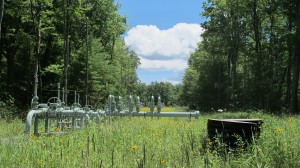U.S. Department of Energy seeks to curb methane emissions from gas infrastructure
-
Marie Cusick

Marie Cusick/ StateImpact Pennsylvania
Natural gas pipelines in Lycoming County. Natural gas systems are the second-leading cause of methane emissions, after agriculture according to the Obama administration.
The U.S. Department of Energy today announced a series of initiatives aimed a curbing methane emissions from the nation’s natural gas infrastructure. Methane is a powerful greenhouse gas that contributes to climate change. It’s released by livestock, landfills, and oil and gas production.
Methane accounts for about 9 percent of the nation’s greenhouse gas pollution, but it’s over 20 times more potent than carbon dioxide as a heat trapping gas.
Scientists are still working to quantify methane emissions and their sources. A slew of papers has recently been published in academic journals. According to the White House, natural gas systems are the second-leading cause of human-related methane emissions, after agriculture.
As part of its broader effort to fight climate change, the Obama administration hosted a series of round-table discussions on how to limit methane leaks from natural gas infrastructure.
Energy Secretary Ernst Moniz called methane both a potent greenhouse gas and a powerful energy resource and says that curbing leaks will be beneficial.
“These benefits include job creation through pipeline and other equipment replacement, cost recovery for infrastructure investments that increase safety and save energy, and opportunities for addressing climate change by reducing greenhouse gas emissions,” he said in a statement.
Here’s the list of the initiatives, from the Department of Energy’s announcement:
-
Efficiency Standards for Natural Gas Compressors – The Energy Department will begin the process of establishing energy efficiency standards for new natural gas compressor units, which are currently estimated to consume more than 7 percent of natural gas in the U.S. Improved efficiency will help provide energy savings for consumers and reduce greenhouse gas emissions.
-
Advanced Natural Gas System Manufacturing – In collaboration with industry, the Department will evaluate and establish a high-impact manufacturing research and development initiative to improve natural gas system efficiency and leak reduction.
-
Incentives for Modernizing Natural Gas Infrastructure – Following discussion with Federal Energy Regulatory Commission Chair Cheryl LaFleur, Secretary Moniz has recommended that FERC look at ways to provide greater certainty for cost recovery for new investment in modernization of natural gas transmission infrastructure.
-
Encouraging State Leadership for Efficient Distribution – The Energy Department will join the National Association of State Regulatory Utility Commissioners in a technical partnership to accelerate investments for infrastructure modernization and repairs to natural gas distribution networks, with DOE providing grant funding and technical assistance to help inform decision-marking by state utility commissioners.
The Interstate Natural Gas Association of America, a gas industry pipeline trade group, points out companies have already made strides reducing leakage rates.
“We are committed to go even further by establishing guidelines to reduce emissions from pipeline equipment, with a particular focus on the types of equipment with the largest emissions profile,” said INGAA President and CEO Don Santa.
Environmental groups praised the move but urged more action.
“These new initiatives and commitments are an important step,” said Environmental Defense Fund President Fred Krupp. “But voluntary commitments can only take us so far – we need coordinated federal and state regulations to address methane pollution and tighten emissions standards
The federal Environmental Protection Agency is holding hearings later this week in Pittsburgh to gather public comments on regulations it proposed in June to cut carbon emissions from the nation’s power plants.
















